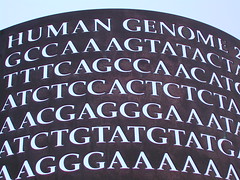February 22nd, 2011 by Medgadget in Better Health Network, Research
No Comments »

 The human genome has been around for a bit more than ten years, but on February 15, 2001, the first complete human genome sequence was published. This was nothing short of a revolution within medicine. Since then, great advancements have been made in our understanding of genetics and its associations with human traits and diseases.
The human genome has been around for a bit more than ten years, but on February 15, 2001, the first complete human genome sequence was published. This was nothing short of a revolution within medicine. Since then, great advancements have been made in our understanding of genetics and its associations with human traits and diseases.
Nature is celebrating this tenth birthday with a special titled “Human Genome at Ten.” In it, multiple papers reflect on what we learned and discovered, what is still unknown, and what we can expect for the near future. Best of all, Nature has packaged the special in a free iPad app for everyone to read, which features interactive graphs, videos, and audio commentaries.
Nature special: The Human Genome at Ten…
iTunes link: Nature Human Genome Special Edition…
*This blog post was originally published at Medgadget*
May 6th, 2010 by PhilBaumannRN in Better Health Network, Health Policy, Opinion, Research
No Comments »


As the costs of sequencing our DNA shrink and the roles of digital media in our lives expand, we will need to understand who (or what) controls the ownership, access and use of our genomic information.
From state regulation to Google to Facebook, who controls the acquisition, transmission and replication of our genomic information and material will become an important battle in the 21st century. Read more »
*This blog post was originally published at Phil Baumann*
April 7th, 2010 by Berci in Better Health Network, Health Policy, News, Opinion, Research
No Comments »

It was just time to end the era of gene patents. About 20 percent of human genes have patents, which is unacceptable. Here’s an excerpt from the New York Times story:
A federal judge on Monday struck down patents on two genes linked to breast and ovarian cancer. The decision, if upheld, could throw into doubt the patents covering thousands of human genes and reshape the law of intellectual property.
One of the individual plaintiffs in the suit, Genae Girard, who has breast cancer and has been tested for ovarian cancer, applauded the decision as “a big turning point for all women in the country that may have breast cancer that runs in their family.”
Chris Hansen, an A.C.L.U. staff lawyer, said: “The human genome, like the structure of blood, air or water, was discovered, not created. There is an endless amount of information on genes that begs for further discovery, and gene patents put up unacceptable barriers to the free exchange of ideas.”
I’m curious how Myriad will respond to it.
*This blog post was originally published at ScienceRoll*
The human genome has been around for a bit more than ten years, but on February 15, 2001, the first complete human genome sequence was published. This was nothing short of a revolution within medicine. Since then, great advancements have been made in our understanding of genetics and its associations with human traits and diseases.














